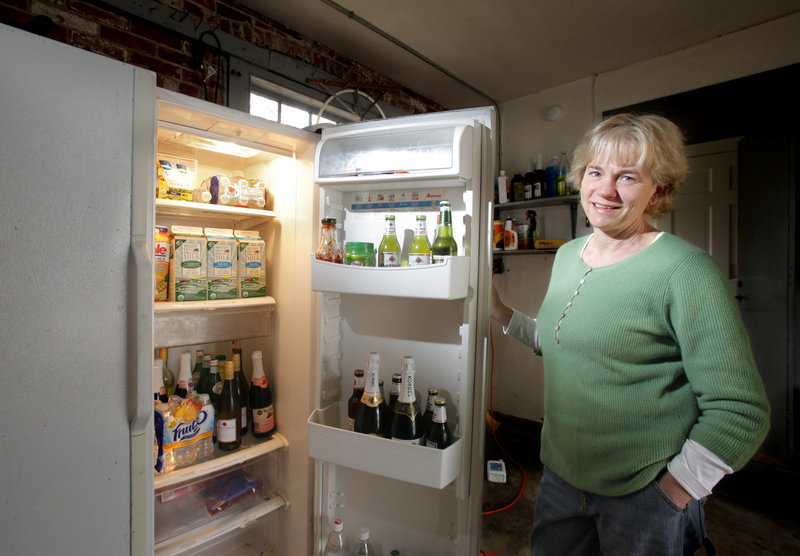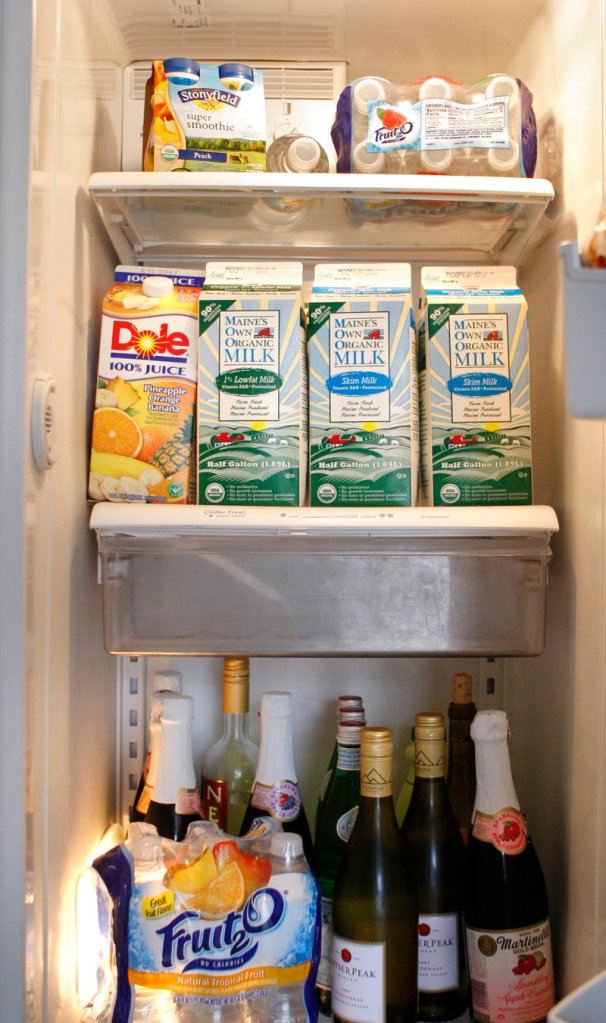Jane Batzell loves her refrigerator. Not the one in her South Portland kitchen, but the unit in her garage, where she stashes beer, wine, cider and “backup juice” for her three teenage boys.
“I’m in and out of that refrigerator every day,” she said.
Michael Stoddard does not love Batzell’s refrigerator. And he’s not cool with the estimated 100,000 secondary refrigerators and freezers humming away in garages, barns and mud rooms across the state.
“People think they’re saving money,” said Stoddard, executive director of Efficiency Maine Trust, the new, independent agency coordinating the state’s conservation efforts. “We’re frugal Yankees. If we have a piece of equipment that’s still working, we hang onto it.”
But it’s often a false economy. Many of these units are relics that consume much more electricity than the latest models. In some instances, buying a new one can pay for itself in lower power bills in just a few years.
This fall, Stoddard’s agency plans to begin offering Maine’s aging-icebox owners a deal. Someone will come and take away your old, working refrigerator for free, and offer a rebate for people who want to upgrade to an energy-efficient model.
As several states and cities have already done, Maine is planning to launch a refrigerator recycling program.
It remains to be seen: Will Mainers embrace cash for coolers, or give the swap-out a frosty reception?
Many Mainers find that a second fridge or freezer offers a sense of self-sufficiency. It’s waiting to swallow holiday leftovers or bargain meat from the warehouse store. It’s ready when it’s time to harvest the garden or if Dad finally gets his deer.
But the usefulness has a hidden cost.
The federal Energy Star program runs an online calculator to figure out how much a refrigerator costs to run. Based on Maine’s average electric rate, a 20-cubic-foot, top-freezer fridge built before 1980 costs $350 a year.
That adds up to $1,750 over five years.
It also adds up to a statewide energy drain.
A consultant hired by the trust figured that between one-fifth and one-quarter of Maine homes have a second refrigerator or freezer, and that most of them are older. Units built before 1993, for instance, consume three to four times more power on average than a new model.
Experience elsewhere suggests Mainers could recycle 40 percent of the extra iceboxes in three years. Assuming the conservative, one-fifth household estimate, that’s 38,000 units.
Based on total consumption, these appliances are guzzling enough energy to power 5,000 homes for a year, the consultant figured.
But the math isn’t as compelling for owners of newer models.
Batzell’s 20-cubic-foot, side-by-side was built in the late 1990s. The government’s calculator estimates it costs $174 a year to run, or $870 over five years. That’s not enough money to convince Batzell to unplug.
“Not for the joy it gives me,” she said.
But Batzell said she might consider upgrading if she thought it would be better for the environment. And a rebate might not hurt, either.
Cold cash is the carrot that other states use to coax vintage refrigerators from reluctant owners.
The Energy Trust of Oregon, an agency similar to what’s ramping up in Maine, began refrigerator recycling in 2008. Cash incentives that range from $30 to $50, as well as free, in-home pick-up, have increased participation.
The program has recycled 15,000 units and saved Oregon residents nearly $1.4 million in energy costs, according to Lisa Scholin, a trust spokeswoman.
“We’ve found that education is an important part of our outreach,” she said, “to help consumers understand that older fridges waste a large amount of energy and the benefits of unplugging them and ensuring that they are responsibly recycled.”
In Maine, it’s also possible that the recycling program could be extended to include primary refrigerators, Stoddard said.
Mainers have shown this year that a little cash can persuade them to replace the kitchen fridge.
Since October, the state’s existing Efficiency Maine program has been giving rebates when people buy selected, Energy Star-rated appliances. The rebate for refrigerators over 7.5 cubic feet is $75. Residents have applied for 6,500 rebates for new refrigerators as of this month. They’ve also bought roughly as many washing machines, which return $50.
“The rebate helps tip people into purchasing Energy Star-level appliances,” said Evelyn deFrees, a spokeswoman for Efficiency Maine.
At the Batzell home, a comparable, Energy Star refrigerator would cost $84 a year to run, as opposed to $174 for the current garage unit. That would save $450 over five years.
The rebate program ends in June, or when the money runs out. It now comes from federal stimulus funds and the regional greenhouse gas reduction plan.
The upcoming recycling program will be subsidized in its first year with federal stimulus funds. After that, it will need to tap utility surcharges, as the Oregon program does.
Stoddard said he hopes refrigerator recycling will gain strong public support in Maine, once people realize they can have cold beer and save money at the same time.
“The popular myth about energy efficiency,” he said, “is that it means doing without.”
Staff Writer Tux Turkel can be contacted at 791-6462 or
tturkel@pressherald.com
Copy the Story Link
Send questions/comments to the editors.





Success. Please wait for the page to reload. If the page does not reload within 5 seconds, please refresh the page.
Enter your email and password to access comments.
Hi, to comment on stories you must . This profile is in addition to your subscription and website login.
Already have a commenting profile? .
Invalid username/password.
Please check your email to confirm and complete your registration.
Only subscribers are eligible to post comments. Please subscribe or login first for digital access. Here’s why.
Use the form below to reset your password. When you've submitted your account email, we will send an email with a reset code.